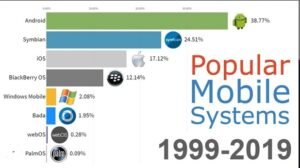Introduction:
Mobile operating systems (OS) serve as the backbone of the modern-day smartphones, enabling users to interact seamlessly with a myriad of applications and services. In this article, we will delve into the evolution, key features, and the significance of mobile operating systems, exploring how they have transformed the way we communicate, work, and entertain ourselves on the go.
I. The Evolution of Mobile Operating Systems:
A. Early Mobile Operating Systems:
The inception of mobile operating systems dates back to the late 20th century when basic mobile phones utilized simple embedded systems for their functionalities. These rudimentary operating systems primarily focused on basic telephony features such as making calls and sending text messages.
B. Emergence of Smartphones:
The paradigm shift occurred with the introduction of smartphones in the early 21st century. BlackBerry OS and Symbian were among the pioneers, offering enhanced features like email, internet browsing, and basic applications. However, their capabilities were limited compared to the smartphones we are accustomed to today.
C. Rise of iOS and Android:
Apple’s iOS and Google’s Android emerged as game-changers in the mid-2000s. iOS, exclusively designed for Apple devices, brought a revolutionary touch-based interface with the launch of the iPhone in 2007. Android, an open-source platform, quickly gained popularity due to its flexibility and availability on a wide range of devices.
II. Key Features of Mobile Operating Systems:
A. User Interface:
The user interface is a crucial aspect of any mobile operating system, influencing user experience. iOS is renowned for its intuitive and sleek design, characterized by a grid of icons. Android, on the other hand, offers a more customizable experience, allowing users to personalize their home screens with widgets, themes, and various app icons.
B. App Ecosystem:
The success of a mobile operating system is often measured by the richness of its app ecosystem. Both iOS and Android boast millions of applications covering a diverse range of categories such as productivity, entertainment, education, and more. The App Store for iOS and Google Play for Android serve as centralized platforms for users to discover and download apps.
C. Security and Privacy:
Security is a top priority in mobile operating systems, given the vast amount of personal data stored on smartphones. iOS is lauded for its stringent app review process and the implementation of features like App Transport Security and Face ID. Android, with its open-source nature, emphasizes user control over app permissions, offering a comprehensive set of security features like Google Play Protect.
D. Updates and Compatibility:
Regular updates are crucial for addressing security vulnerabilities and introducing new features. iOS enjoys an advantage in this regard, as updates are pushed simultaneously to all supported devices. Android, with its diverse hardware ecosystem, faces challenges in delivering timely updates to all devices, as manufacturers and carriers often introduce delays.
III. Dominant Mobile Operating Systems:
A. iOS:
Developed by Apple Inc., iOS is the exclusive operating system for iPhones, iPads, and iPod Touch devices. Known for its seamless integration with Apple’s hardware, iOS delivers a consistent user experience across the ecosystem. Key features include the App Store, Siri voice assistant, and iCloud for seamless data synchronization.
B. Android:
Developed by the Open Handset Alliance and led by Google, Android is an open-source operating system adopted by a plethora of device manufacturers. Its open nature allows for extensive customization, and features like Google Assistant, Google Play Store, and seamless integration with Google services contribute to its widespread popularity.
C. Other Operating Systems:
While iOS and Android dominate the market, other operating systems like KaiOS, used in feature phones, and HarmonyOS, developed by Huawei, aim to carve a niche in the industry. However, the duopoly of iOS and Android remains largely unchallenged.
IV. Future Trends and Innovations:
A. Foldable Devices:
The advent of foldable smartphones introduces a new dimension to mobile operating systems. Operating systems must adapt to the changing form factors and provide a seamless experience as users transition between folded and unfolded states. Both iOS and Android are exploring ways to optimize their interfaces for these innovative devices.
B. Augmented Reality (AR) and Virtual Reality (VR):
The integration of AR and VR technologies into mobile operating systems opens up exciting possibilities. Apple’s ARKit and Google’s ARCore have already laid the foundation for immersive experiences, and future updates are expected to enhance the role of AR and VR in day-to-day activities.
C. 5G Integration:
The rollout of 5G networks significantly impacts mobile operating systems by enabling faster internet speeds and low-latency connectivity. Operating systems need to optimize their performance to harness the full potential of 5G, facilitating seamless streaming, real-time gaming, and enhanced communication.
V. Conclusion:
Mobile operating systems have come a long way from the basic functionalities of early mobile phones to the sophisticated ecosystems of today’s smartphones. The evolution of iOS and Android has shaped the way we interact with technology, influencing our daily lives in profound ways. As we look towards the future, ongoing innovations and emerging technologies will continue to redefine the landscape of mobile operating systems, providing users with increasingly powerful and versatile experiences on their mobile devices.







Pingback: Mastering Your Redmi: A Guide to Disabling Glance Feature on Your Smartphone - hiphonest.com
Pingback: How To Disable Call Recording Announcement On Redmi Note 10 - Hiphonest.com
Полностью стильные новости мира fashion.
Важные эвенты мировых подуимов.
Модные дома, торговые марки, гедонизм.
Свежее место для модных хайпбистов.
https://malemoda.ru/
Style, luxury, travel
First fashion application for hypebeasts and cute people.
Style news, events. Latest collections, collaborations, drops.
https://dubai.luxepodium.com/
Fashion, luxury, hedonism
Best style application for hypebeasts and stylish people.
Podium news, events. Last collections, collaborations, drops.
https://lepodium.in/
Избранные свежие новости мира часов – последние коллекции известных часовых компаний.
Все варианты часов от бюджетных до очень премиальных.
https://podium24.ru/
Абсолютно все актуальные новости мира часов – последние новинки известных часовых компаний.
Абсолютно все варианты часов от доступных до экстра премиальных.
https://bitwatch.ru/
Несомненно стильные новинки подиума.
Все события самых влиятельных подуимов.
Модные дома, лейблы, haute couture.
Лучшее место для модных людей.
https://luxe-moda.ru/
Полностью трендовые события модного мира.
Актуальные мероприятия самых влиятельных подуимов.
Модные дома, лейблы, haute couture.
Новое место для трендовых хайпбистов.
https://fashion5.ru/
Очень трендовые новости индустрии.
Важные мероприятия лучших подуимов.
Модные дома, бренды, гедонизм.
Интересное место для стильныех людей.
https://rfsneakers.ru
Точно трендовые события моды.
Важные новости всемирных подуимов.
Модные дома, бренды, высокая мода.
Интересное место для модных людей.
https://modavmode.ru
Абсолютно стильные новости мировых подиумов.
Абсолютно все эвенты всемирных подуимов.
Модные дома, торговые марки, гедонизм.
Интересное место для стильныех хайпбистов.
https://miramoda.ru
Несомненно актуальные события модного мира.
Исчерпывающие события мировых подуимов.
Модные дома, торговые марки, haute couture.
Приятное место для трендовых хайпбистов.
https://sofiamoda.ru
Точно актуальные новинки модного мира.
Все новости всемирных подуимов.
Модные дома, лейблы, высокая мода.
Новое место для модных хайпбистов.
https://fashionsecret.ru
Наша ежедневная лента новостей даст возможность вам всегда быть информированными на тему интересных новостей.
https://pitersk.ru/articles/2024-08-20-7-ocharovatelnyh-lukov-s-tsvetochnymi-platyami-zimmermann/